
Veganism is the practice of abstaining from the use of animal products, particularly in diet, and an associated philosophy that rejects the commodity status of animals. An individual who follows the diet or philosophy is known as a vegan. Distinctions may be made between several categories of veganism. Dietary vegans, also known as "strict vegetarians", refrain from consuming meat, eggs, dairy products, and any other animal-derived substances. An ethical vegan, also known as a "moral vegetarian", is someone who not only follows a vegan diet but extends the philosophy into other areas of their lives, and opposes the use of animals for any purpose. Another term is "environmental veganism", which refers to the avoidance of animal products on the premise that the industrial farming of animals is environmentally damaging and unsustainable.

Permaculture is an approach to land management that adopts arrangements observed in flourishing natural ecosystems. It includes a set of design principles derived using whole systems thinking. It uses these principles in fields such as regenerative agriculture, rewilding, and community resilience.

Forest gardening is a low-maintenance, sustainable, plant-based food production and agroforestry system based on woodland ecosystems, incorporating fruit and nut trees, shrubs, herbs, vines and perennial vegetables which have yields directly useful to humans. Making use of companion planting, these can be intermixed to grow in a succession of layers to build a woodland habitat.

Freeganism is an ideology of limited participation in the conventional economy and minimal consumption of resources, particularly through recovering wasted goods like food. The word "freegan" is a portmanteau of "free" and "vegan". While vegans avoid buying animal products as an act of protest against animal exploitation, freegans—at least in theory—avoid buying anything as an act of protest against the food system in general.

Simple living encompasses a number of different voluntary practices to simplify one's lifestyle. These may include, for example, reducing one's possessions, generally referred to as minimalism, or increasing self-sufficiency. Simple living may be characterized by individuals being satisfied with what they have rather than want. Although asceticism generally promotes living simply and refraining from luxury and indulgence, not all proponents of simple living are ascetics. Simple living is distinct from those living in forced poverty, as it is a voluntary lifestyle choice.
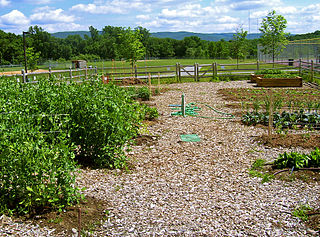
The following outline is provided as an overview of and topical guide to organic gardening and farming:
Vegan organic gardening and farming is the organic cultivation and production of food crops and other crops with a minimal amount of exploitation or harm to any animal. Vegan gardening and stock-free farming methods use no animal products or by-products, such as bloodmeal, fish products, bone meal, feces, or other animal-origin matter, because the production of these materials is viewed as either harming animals directly, or being associated with the exploitation and consequent suffering of animals. Some of these materials are by-products of animal husbandry, created during the process of cultivating animals for the production of meat, milk, skins, furs, entertainment, labor, or companionship; the sale of by-products decreases expenses and increases profit for those engaged in animal husbandry, and therefore helps support the animal husbandry industry, an outcome most vegans find unacceptable.

A plant-based diet or a plant-rich diet is a diet consisting mostly or entirely of foods derived from plants and with few or no animal-source foods. A plant-based diet is not necessarily vegetarian. The use of the phrase "plant-based" has changed over time and examples can be found of the phrase "plant-based diet" being used to refer to vegan diets, which contain no food from animal sources, and vegetarian diets, which may include dairy or eggs but no meat, as well as diets with varying amounts of animal-based foods, such as semi-vegetarian diets. The Academy of Nutrition and Dietetics states that well-planned plant-based diets support health and are appropriate throughout all life stages, including pregnancy, lactation, childhood, and adulthood, as well as for athletes.
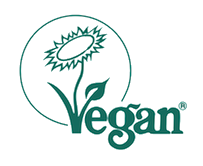
The Vegan Society is a registered charity and the oldest vegan society in the world, founded in the United Kingdom in November 1944 by Donald Watson and his wife, Dorothy, along with four friends – Elsie Shrigley, Mr G. A. Henderson and his wife Fay K. Henderson among them.
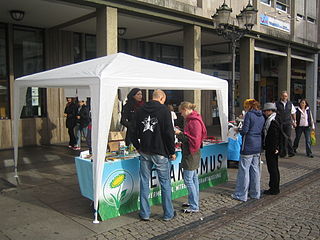
World Vegan Day is an annual event celebrated by vegans around the world every 1 November. The benefits of veganism for humans and the natural environment are celebrated through activities such as setting up stalls, hosting potlucks, and planting memorial trees. The event was established in 1994 by Louise Wallis, then Chair of The Vegan Society in the United Kingdom, to commemorate the 50th anniversary of the founding of the organisation and the coining of the terms "vegan" and "veganism". Speaking in 2011, Louise Wallis said: "We knew the Society had been founded in November 1944 but didn’t know the exact date, so I decided to go for 1 November, partly because I liked the idea of this date coinciding with Samhain/Halloween and the Day of the Dead – traditional times for feasting and celebration, both apt and auspicious."

The Animal Protection and Rescue League (APRL) is an American grassroots animal rights organization, founded in 2003, based in California's San Diego and Orange Counties.
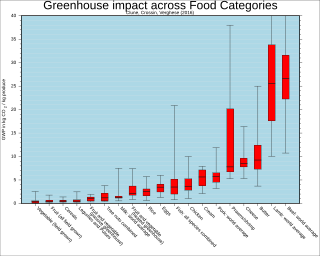
Environmental vegetarianism is the practice of vegetarianism when motivated by the desire to create a sustainable diet that avoids the negative environmental impact of meat production. Livestock as a whole is estimated to be responsible for around 18% of global greenhouse gas emissions. As a result, significant reduction in meat consumption has been advocated by, among others, the Intergovernmental Panel on Climate Change in their 2019 special report and as part of the 2017 World Scientists' Warning to Humanity.
World Vegetarian Day is observed annually around the planet on October 1. It is a day of celebration established by the North American Vegetarian Society in 1977 and endorsed by the International Vegetarian Union in 1978, "To promote the joy, compassion and life-enhancing possibilities of vegetarianism." It brings awareness to the ethical, environmental, health, and humanitarian benefits of a vegetarian lifestyle.

Veggies of Nottingham, also known as Veggies Catering Campaign, is a company and a campaigning group based in Nottingham, England, promoting ethical alternatives to mainstream fast food. It does this by hosting events such as the annual East Midlands Vegan Festival, publishing books and leaflets, and maintaining an extensive website, including a Contacts Directory of groups with similar aims. As a non-profit worker co-operative it also provides affordable, wholesome, minimally-packaged vegan catering at a wide range of events and protests using fair trade, organic and/or locally sourced ingredients.
Women have played a central role in animal advocacy since the 19th century. The animal advocacy movement – embracing animal rights, animal welfare, and anti-vivisectionism – has been disproportionately initiated and led by women, particularly in the United Kingdom. Women are more likely to support animal rights than men. A 1996 study of adolescents by Linda Pifer suggested that factors that may partially explain this discrepancy include attitudes towards feminism and science, scientific literacy, and the presence of a greater emphasis on "nurturance or compassion" amongst women. Although vegetarianism does not necessarily imply animal advocacy, a 1992 market research study conducted by the Yankelovich research organization concluded that "of the 12.4 million people [in the US] who call themselves vegetarian, 68% are female, while only 32% are male".

The American Vegan Society (AVS) is a 501(c)(3) nonprofit organization that promotes veganism in the United States.
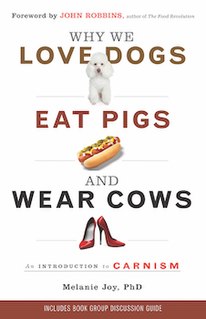
Why We Love Dogs, Eat Pigs, and Wear Cows: An Introduction to Carnism (2009) is a book by American social psychologist Melanie Joy about the belief system and psychology of meat eating, or "carnism". Joy coined the term carnism in 2001 and developed it in her doctoral dissertation in 2003. Carnism is a subset of speciesism, and contrasts with ethical veganism, the moral commitment to abstain from consuming or using meat and other animal products. In 2020, an anniversary edition of the book was published by publisher Red Wheel.
Vegetarian ecofeminism is an activist and academic movement which states that all types of oppression are linked and must be eradicated, with a focus on including the domination of humans over nonhuman animals. Through the feminist concept known as intersectionality, it is recognized that sexism, racism, classism, and other forms of inter human oppression are all connected. Vegetarian ecofeminism aims to include the domination of not only the environment but also of nonhuman animals to the list. Vegetarian ecofeminism is part of the academic and philosophical field of ecofeminism, which states that the ways in which the privileged dominates the oppressed should include the way humans dominate nature. A major theme within ecofeminism is the belief that there is a strong connection between the domination of women and the domination of nature, and that both must be eradicated in order to end oppression.

Animal Liberation Queensland (ALQ) is an independent not-for-profit animal rights organisation operating in Queensland, Australia. Founded in 1979 by Jacki Batzloff, ALQ advocates for the rights of animals, exposing animal abuse and exploitation. ALQ is a registered charity with the Australian Charities and Not-for-profits Commission (ACNC) and its headquarters are located in Brisbane.














